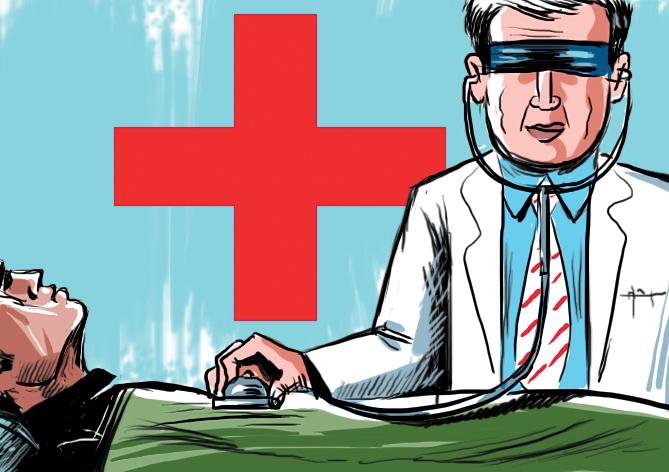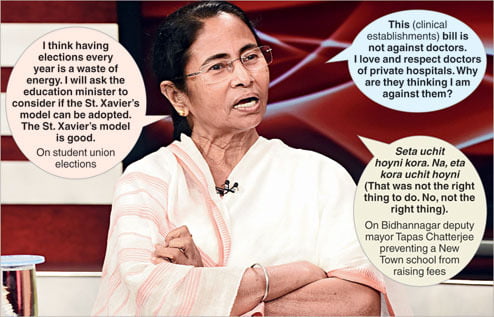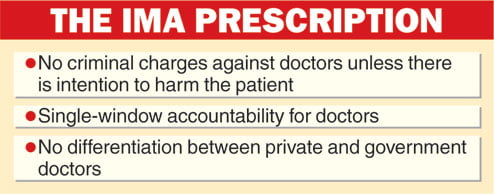Let’s take a look at how the Clinical Establishment Act has “helped” the health set-up:
Incident 1:
A critical patient is admitted to the ICU of a private hospital. The patient progressively worsens and unfortunately, dies. The patient party ransacks the hospital, threatening everybody on duty with, “Dekhe nebo, joto shob chorer dol.” (We’ll see through this, all of you are bloody thieves).
Incident 2:
Mr. X, a patient is admitted to a hospital. He has to undergo some procedures for the restorations of his health. With the treatment, Mr. X gets better and is ready to be discharged. On the day of discharge, the patient party feels that the hospital has overcharged them and walks away without paying a single penny, threatening to go to Mamata Banerjee if they are not allowed to walk free.
Incident 3:
Mrs. P is admitted to a hospital for her gall bladder surgery. The operation proceeds well and she is discharged without any complications. However, Mrs. P and her family file a complaint against the surgeon and the hospital authority after 2 years because they feel that their patient was not given adequate care 2 years back. Now, they want a refund of their expenses.
The answer to the common man’s every problem: The Clinical Establishment Bill.
Find a doctor to blame and voilà, the Clinical Establishment Bill will come to your rescue.
What is the Clinical Establishment Act?
The West Bengal Clinical Establishments (Registration, Regulation, and Transparency) Bill, 2017, drawn up by the Mamata Banerjee government contains stringent norms for the functioning of hospitals and proposes hefty penalties for possible lapses.
What is it supposed to do?
The bill is primarily aimed towards the benefit of the patients and their families. Among other things, it aims to:
- Follow “fixed rates and charges, including the package rates for investigation, bed charges, operating theater procedures, intensive care, ventilation, implants, consultation and similar tests and procedures”. Any additional treatment or procedure shall not attract additional charges “over and above the fixed rates and charges, including the package rates”.
- Provide a proper estimate of cost of treatment “not covered in fixed rates and charges, including the package rates”. The final bill cannot exceed the estimate by more than a percentage fixed by the government.
- Release the body of a patient even if the bill for treatment has not been paid.
- Maintain grievance cells for patients and their kin to accept complaints about treatment, billing and staff behaviour.
The bill also arranges for hefty penalties to be paid by hospitals and doctors who are found to be defaulters. Not to forget: there are provisions for pressing criminal charges on the treating physician.
And then, things got out of hand…
The act was introduced in good faith but with extremely poor execution. Under recent circumstances, the act has become a hindrance to the normal functioning of a clinical establishment.
Also read: Expensive Bills In A Private Hospital In NOT Your Doctor’s Fault: Doctors Are Not Thieves
Out of fear of getting sued, doctors are not undertaking any risks. In medicine, that could mean losing a patient. For example, suppose you get a stone in your gall bladder. It could be removed either in the open method or by laparoscopic method.
However, a laparoscopic operation will be significantly more expensive than an open one albeit, with lesser morbidity. Under the present situation, out of fear of getting sued for “overcharging” a patient, a doctor would rather choose the open method, or worse, defer the operation until it is absolutely necessary.
Because, what is the guarantee that you won’t be coming back to the surgeon and the hospital with a lawsuit for “exorbitant charges’?
All over West Bengal, surgeons are delaying operations indefinitely and doctors are reluctant to take risks which could probably save the patient. This act has put so much power into the hands of the ‘uneducated’ mass that everyone feels they have a right to beat up the doctor if things don’t go according to their wish.
Around 50% of operative procedures have been stalled across West Bengal in private hospitals. The districts have taken the worst hit with innumerable small hospitals shutting down, being unable to pay their employees. And how could they when patient parties walk away of their own free will after receiving treatment and without paying a penny?
Here’s how things have worsened
Because many doctors are refusing procedures out of fear of getting beaten up and with private hospitals closing down, the government hospitals are bearing the brunt of the load.
Anybody from Bengal knows how understaffed a government hospital is and the same understaffed hospital is now handling even more patients.
Any slight miscommunication between the patient party and the doctor almost invariably ends up with the doctor getting beaten up. There has been at least 10 such incidents in the past two weeks, across Bengal. Quite naturally, there is growing dissent among the doctors.
A government unable to provide security to its employees is a failure.
Chief Minister Mamata Banerjee’s intention behind introducing the Clinical Establishment Act was “Treatment With Smile.” A very noble intent, no doubt.
However, the government has to realize that such safe playing on the part of doctors is ultimately detrimental for patient health. An employed doctor is never responsible for the unfair practices of a hospital administration. So why should he/she take a hit?
There is still time to reverse this vicious cycle. Instead of letting doctors get beaten up across the state and pretending like nothing happened, maybe it’s time to finally ensure a healthy working environment.
Image credits: Google
Other Recommendations:
http://edtimes.in/2017/03/doctors-wear-helmets-in-aiims-to-protest-against-another-doctor-being-kicked-like-a-street-dog/




































It should be made compulsory for all political parties to have a committee comprising of medical professionals,these professionals should be consulted before making any laws by govt and opposition,and taking in addition the opinion of all medical societies,and doctors,